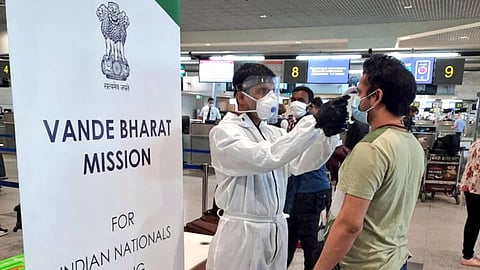The Vande Bharat Mission has brought back nearly 2.5 lakh Indians stuck overseas due to the Corona pandemic since 7 May. This was primarily through national carrier Air India and its subsidiary Air India Express. There were some charter aircraft and international carriers too that were a part of the evacuation process.
As a part of the third phase, three private carriers from India – GoAir, Vistara and have joined the evacuation process.
“As per the government’s policy for evacuation, Indians with ‘compelling reasons’ were allowed to return; this included pregnant women, elderly people, students and those facing the prospect of deportation. The first phase of the mission was carried out from 7-15 May, the second from 17-22 May (which got extended to 10 June), and the third is from 11 June to 2 July,” says Hardeep Singh Puri, minister of state for civil aviation. In the ongoing phase, around 550 flights would be operated (including 191 feeder flights) covering 41 countries and operating from 55 international airports and 27 domestic airports.
Private carriers GoAir, Vistara, and Indigo have joined the mission. “In an endeavour to support the nation in repatriation under the Vande Bharat Mission, GoAir operated its maiden flight from Kuwait to Jaipur via Ahmedabad. We followed the rules laid down by the government of Kuwait, Government of India, ministry of external affairs, ministry of civil aviation and state governments of Gujarat and Rajasthan,” says a GoAir spokesperson.
Safety norms
The crew wears the mandatory safety gear – hazmat suits, masks, gloves, and headgear – through the flight. Food boxes and water bottles are kept on the seat and no service is allowed during the flight. The aircraft is sanitised before and after the flight. “Wearing hazmat suits isn’t easy while flying. We have done some turnaround flights to the Gulf from Kochi and as we don’t deplane while landing it becomes really hot and unbearable. However, we do comply with the safety norms as it is in the interest of our passengers,” says a pilot who regularly flies on the Kochi-Gulf sector of Air India Express.
Meanwhile, “The fares that the private airlines charge will not be market fare but will be pre-determined comparable to what Air India and Air India Express are levying. Domestic flights resumed within India from 25 May. Till 18 June there have been 749 departures and 753 arrivals. Around 62,850 passengers were handled on arrival and 63,192 on departure,” says Pradeep Kharola, secretary, civil aviation, speaking about the fares that private carriers charge passengers during these evacuation flights.
Regarding the resumption of international flights, Puri says it is based on several factors including the lifting of airspace restrictions by various countries, quarantine norms, and ease of travel within those countries for incoming passengers. One more factor that they would consider before restarting international flights is when domestic traffic reaches about 50 to 60 per cent.
For a passenger wanting to return to India, he has to first apply in the Indian embassy or High Commission. Following the approval, he can book his tickets to India.
Interestingly, despite the chaos that the outbreak of the pandemic has created globally, the minister of civil aviation is optimistic of the disinvestment of Air India. He says that the national carrier is a first-class asset and the disinvestment would come through once things settle down a bit.

